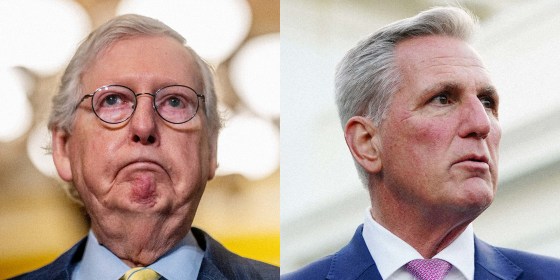On paper, Kevin McCarthy, R-Calif., should be the most influential Republican officeholder in the country. He’s speaker of the House, the most powerful member of the most powerful branch of government, and third in line for the presidency. His majority may be small and raucous, but it’s a majority nonetheless — and no smaller than the majority with which former Speaker Nancy Pelosi, D-Calif., secured a variety of sweeping legislative achievements.
And yet, if you had to trade places with one Republican in congressional leadership, few would likely prefer McCarthy’s position over Senate Minority Leader Mitch McConnell’s. Leadership has its privileges, including influence over those who would challenge leadership. Where McCarthy has surrendered much of that authority, McConnell is exercising it with gusto.
McConnell, R-Ky., is not exactly beloved by much of the Republican Party’s primary electorate. For all his conservative achievements and his effective efforts to frustrate Democratic ambitions, he has been cast in many Republican minds as unwilling to “fight” for one cause or another. After the 2022 midterms, that dynamic convinced some Republican senators that they could dislodge McConnell from his perch. They lunged at the king and missed. McConnell easily defeated Sen. Rick Scott, R-Fla., and was re-elected as Senate GOP leader.
Unlike McCarthy, McConnell has reserved the right to extract his revenge — and it seems he’s inclined to settle all family business. On Feb. 1, reporters learned that Scott and Sen. Mike Lee, R-Utah, were removed — rather, “kicked off,” in Scott’s words — from their seats on the influential Senate Commerce Committee. Scott insists his defenestration is payback for his attempt to oust McConnell from leadership, a bid Lee supported.
For his part, McConnell has made only perfunctory efforts to disguise his contempt for the Florida senator, who claims he was informed of his unceremonious ouster via text message. Last year, McConnell came out forcefully and early against Scott’s effort to freelance a Republican agenda into existence, which included a variety of ambitious proposals including the sunsetting of all federal laws and slashing the federal workforce by 25%. McConnell allies accused Scott of mismanaging the National Republican Senatorial Committee when he chaired it during the 2022 election cycle, claiming that the party’s disappointing performance was partially due to the misallocation of committee funds. And in a radio interview last week, McConnell questioned Scott’s electoral viability, noting that his “bad idea” on entitlements could cost him in “a state with more elderly people than any other state in America.”
Lee and Scott aren’t the only Republicans experiencing the consequences of their own actions. CQ Roll Call reported last week that Missouri Sen. Josh Hawley was “booted from his perch on the powerful Armed Services Committee.” According to CQ Roll Call, Hawley’s ouster was “retribution” for his quixotic campaign to force Defense Secretary Lloyd Austin and Secretary of State Antony Blinken to resign by holding up civilian nominees to Pentagon posts and for Hawley’s support for Scott’s challenge to McConnell. Both McConnell’s and Hawley’s offices deny that the senator’s departure from Armed Services is the result of reciprocity. If that’s true, however, it still suggests that Hawley is willing to do what must be done to restore collegial relations with the minority leader.
Such a gesture would hardly be remarkable. Indeed, this is how effective and competent congressional leaders preserve good working order. Senate party leaders lack any enumerated constitutional authority. Leadership’s authority is largely a function of party politics, and the privileges that flow from that office to individual members are leadership’s prerogative. There are a variety of tools leaders can wield to keep their members in line, like doling out committee assignments, backing specific policy riders or scheduling votes, including particular amendments in unanimous consent agreements. Some of these inducements may be more effective than others, but they all serve to keep a conference full of ambitious political animals from cannibalizing one another.
Unlike McConnell, McCarthy sacrificed his ability to wield some of these tools. To secure the speakership over the objection of a few recalcitrant Republicans, McCarthy gave in to a number of demands. Most of changes sought by the mutineers were designed to make the body more small-d “democratic,” which perhaps sacrifices some discipline but only in service to unobjectionable goals like restoring the regular order to the process of lawmaking.
But that’s not all to which McCarthy agreed. He gave a number of key committee posts to his conference’s insurgent members, including on the Rules and Steering committees — two entities that often pick the winners and losers of intra-member feuds. He caved on oft-derided “earmarks” — specific appropriations sought by individual members — which allow lawmakers to direct spending toward their districts (a role that reverts to the executive branch in the absence of congressional direction). And he allowed for “open rule” votes on amendments submitted by any member, including Democrats, which could force his vulnerable members to take damaging votes on showpiece legislation.
The measures McCarthy caved on may have been hard to defend from populist attacks, but they served to keep the House in order while protecting the majority party from the disaggregating forces of partisan politics. It’s likely true that the founders would not be surprised by an unruly House of Representatives. It was designed to be an undisciplined body, though not an ungovernable one. But McCarthy has relinquished many of the tools McConnell is presently wielding to keep his conference in line. As a result, outside observers are likely to witness a stark contrast between the tidy Senate Republican Conference with little legislative power and the rowdy majority in the House that sets the legislative agenda. Voters will draw their conclusions about Republican governance accordingly.

